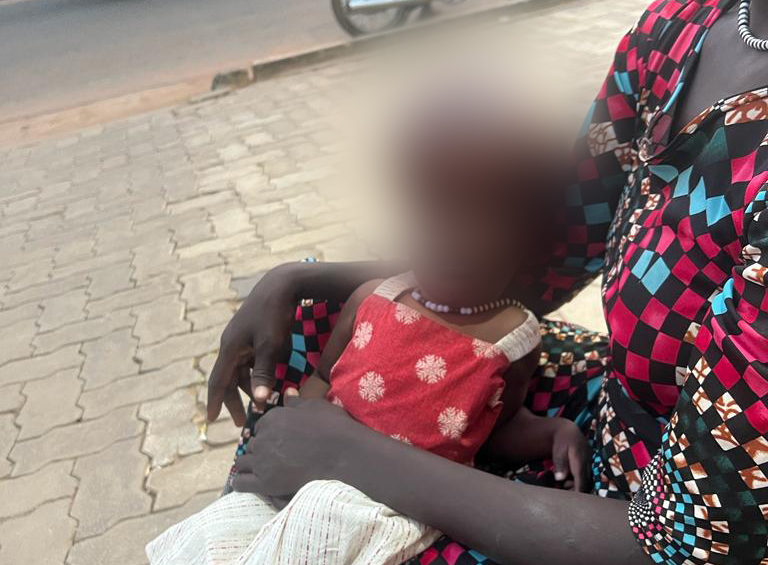
One of the mothers of hydrocephalus children risk losing their marital status - credit - Atem Jennifer
Mothers of children with Hydrocephalus face social rejection and risk losing their marital status in South Sudan.
This comes after Ater Dut, a mother of a hydrocephalus child was chased away by her husband.
Hydrocephalus is an abnormal buildup of fluid in the ventricles (cavities) deep within the brain.
This excess fluid causes the ventricles to widen, putting pressure on the brain’s tissues.
Cerebrospinal fluid (CSF) is the clear, colorless fluid that protects and cushions the brain and spine. Normally, cerebrospinal fluid flows through the ventricles and bathes the brain and spinal cord before being reabsorbed into the bloodstream.
The body typically produces enough CSF each day and absorbs the same amount.
However, when the normal flow or absorption of CSF is blocked it can result in a buildup of CSF.
The pressure from too much CSF can keep the brain from functioning properly and cause brain damage and even death.
According to Ater Dut, her child is discriminated because of the big size of the head.
She says the father of her child said the child is a demon.
Ater pointed out that she doesn’t even have peace at home since her elder brother also hates the child to the extend the child is not allowed to sleep on the bed.
“He [the father of child] told me he doesn’t want this child, a child with big head, a demon, I don’t want it. His people [relatives] hate the child. They say I gave birth to Satan not a child,” Ater said.
“Even when I put the child where people are, they don’t want him. If I put him on the bed, they say put him on the ground. My mother and father died, but I have my siblings. My elder brother even doesn’t also want the child too.”
For her part, Victoria Rube, a Social Worker at Usratuna Health Center told Eye Radio that Hydrocephalus cases are on rise in South Sudan.
She says at least 38 cases of Hydrocephalus have been confirmed in January and February this year.
Rube added that a total of 94 cases of Hydrocephalus were confirmed last year in which 5 of the children succumbed to the disease.
Though treatment is often helpful, it may take multiple surgeries to treat hydrocephalus.
Hydrocephalus is the most common reason for brain surgery in young children and after treatment, these children lead normal and productive lives.
According to Victoria Rube, children from South Sudan are taken to Uganda in Mbale Cure Hospital which is specialized on such cases.
This is due to lack of neurosurgeons and unconducive environment in the country.
Usratuna receives those children and do the process of getting the travelling permit from the ministry of Nationality and passport.
Then proceeds to get approval letter from the ministry of Health to help them with the Covid- 19 test and an ambulance to take the children to Nimule where the other driver from cure hospital takes them from Elegu then to the surgery center.
Rube says they go through a number of challenges in the process of transferring the children.
“The challenge is that when you go to the ministry to approval the names of the children that are taken to Uganda, it takes them long to approve. And also if it is an emergency case that a child cannot wait for a week,” Rube said.
“We tell the parents to go and process their travelling documents and in that process, they ask them an amount of money that the parents cannot be able to pay and others will sometimes give up. So that is really a challenge to us.
“Also at the Covid lab for testing you find that other children names are missing and there is a lot of misplace of results and it is really very hectic.”
However, National Institute of Neurological Disorders and Stroke (NINDS) is seeking fundamental knowledge about the brain and nervous system to reduce the burden of neurological disease.
NINDS is a component of the National Institutes of Health, the leading supporter of biomedical research in the world.
NINDS conducts research and clinical studies to find better ways to prevent, treat, and ultimately cure disorders such as hydrocephalus.
The NINDS helps support the Hydrocephalus Clinical Research Network (HCRN), a collaboration of pediatric neurosurgery centers working together to improve the lives of children with hydrocephalus.
The HCRN centers pool their hydrocephalus patient populations to more rapidly study the potential for improved treatments.
The HCRN conducts multiple, simultaneous studies at its centers and maintains a substantial registry of patients and procedures.
Support Eye Radio, the first independent radio broadcaster of news, information & entertainment in South Sudan.
Make a monthly or a one off contribution.
Copyright 2024. All rights reserved. Eye Radio is a product of Eye Media Limited.